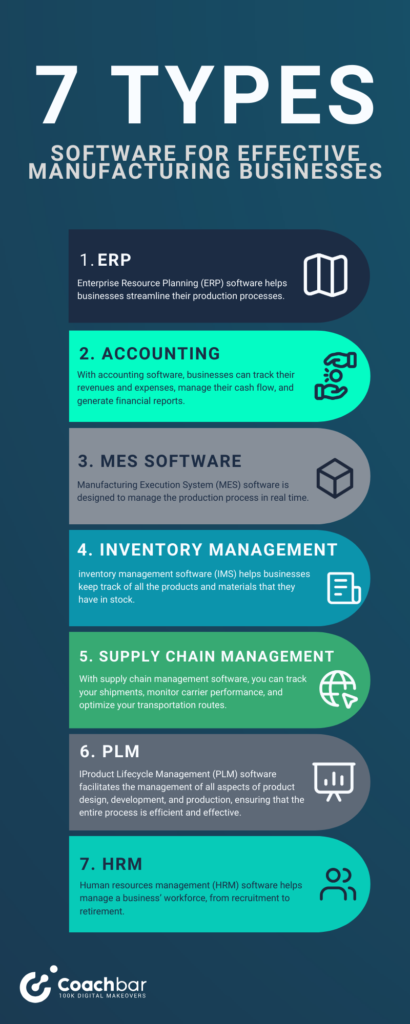Running a manufacturing business successfully is a complex process. From supply chain management to inventory organization, there are various stages to a production cycle, and managing all of them effectively requires specialized software.
In this article, we'll show you the seven types of software you need to effectively run your manufacturing business and how they can help streamline your operations and boost your productivity.
Table of Contents
Toggle1. ERP software
Enterprise Resource Planning (ERP) software helps you streamline your production processes. By automating tasks and workflows, you can reduce the risk of errors and delays and improve the overall quality of your products.
You can use ERP software to monitor your production lines in real time, allowing you to identify and address any issues quickly. It can also help you manage your finances more effectively.
Integrating your financial data with your other business processes gives you a complete view of your company's financial health. Using your ERP software, you can generate accurate financial reports, forecast future revenue and expenses, and identify areas where you can reduce costs.
ERP software can also help you improve your customer service. By providing your customer service representatives with real-time data, they can quickly respond to customer inquiries and resolve issues. Your team will also be able to track customer orders and preferences, allowing you to personalize your products and services to better meet their needs.
Finally, ERP software can help you stay compliant with regulations and standards. By automating compliance tasks and workflows, you can reduce the risk of errors and ensure that you meet all necessary requirements.

This can help you avoid costly fines and legal issues and protect your company's reputation.
Overall, ERP software is a powerful tool that can help you manage your business more effectively. Integrating all of your processes and departments into one centralized system can reduce costs, increase efficiency, and improve the quality of your products and services.
2. Accounting software
If you’re not using or ready for an ERP system, you can be very successful by choosing one of the two leading cloud accounting solutions (QuickBooks or Xero) and adding a second software solution to manage your manufacturing operations. Effectively managing your finances is critical to the success and growth of your manufacturing business. According to the US Census Bureau Index, 20% of small businesses without accounting software struggle to last their first year.
With accounting software, you can track your revenues and expenses, manage your cash flow, and generate financial reports. This software can help you make informed decisions about your business, identify areas for improvement, and ensure compliance with legal and financial regulations.
Implementing accounting software can also help you streamline your financial operations. Automating tasks such as invoicing, payment processing, and bank reconciliations saves valuable time and reduces the risk of errors.
Many accounting software solutions offer integrations with other business tools, such as inventory management systems, to provide a more complete picture of your financial health.
One of the key features of accounting software is its ability to generate detailed financial reports. These reports can provide insights into your business's performance, including revenue trends, expense breakdowns, and cash flow projections. By regularly reviewing these reports, you can identify areas where you can cut costs, improve efficiency, and increase profitability.
A key advantage of accounting software is its scalability. As your manufacturing business grows, your financial needs will become more complex. Accounting software can help you manage this growth by providing features such as multi-currency support, advanced inventory tracking, and project accounting. With these tools, you can stay on top of your finances and make informed decisions about the future of your business.
Implementing the right accounting software will also help you stay compliant with financial regulations. Many software solutions offer features such as tax calculation and compliance reporting, ensuring that you are meeting all legal requirements. This can save you time and money on costly fines and legal fees.
By automating tasks, generating detailed reports, and providing scalability and compliance features, this type of software is useful for helping you make informed decisions to ensure the long-term success of your business.
3. Manufacturing Execution System (MES) software
Manufacturing Execution System (MES) software is designed to manage the production process in real time. This software can help you monitor your production lines, track quality control, and optimize your production processes. MES software can also help you identify potential bottlenecks and delays, enabling you to take proactive steps to address them.
A key benefit of MES software – and a reason why most successful manufacturing businesses use it – is its ability to help track product traceability. This can help you ensure your products are compliant with local and international regulations and protect your brand reputation. There are two excellent choices for automating your manufacturing business to achieve greater efficiency and profitability: Kanta and Cin7 Core. Both solutions are well fit for a wide variety of manufacturing businesses.
4. Inventory Management Software (IMS)
Effective inventory management is critical to the success of any manufacturing business, which is where inventory management system (IMS) software becomes integral. With inventory management software, you can manage your inventory levels, track orders, and monitor stock levels in real time. This software can help you reduce inventory carrying costs, minimize stockouts, and improve order fulfillment rates.
But what exactly is inventory management software? Essentially, it's a tool that helps you keep track of all the products and materials that your business has in stock. This includes everything from raw materials to finished products. The software can provide you with real-time data on inventory levels, which can help you make informed decisions about when to order more supplies or when to scale back production.
One of the key benefits of inventory management software is reducing inventory carrying costs. Carrying costs include things like storage fees, insurance, and depreciation. By keeping a close eye on your inventory levels, you can avoid overstocking and reduce these costs. You’ll also be able to identify slow-moving items that may be tying up valuable warehouse space.
You can also say goodbye to stockouts. Stockouts occur when you run out of a particular item and are unable to fulfill customer orders. This can lead to lost sales and unhappy customers. By using inventory management software to track stock levels in real time, you’ll always have enough inventory on hand to meet demand.
Inventory management software will also help improve order fulfillment rates. By automating many of the processes involved in managing inventory, you can free up your staff to focus on other critical tasks, such as processing orders and handling customer inquiries. This can help you improve your overall order fulfillment rates and provide a better customer experience.
5. Supply Chain Management software
If you’re a large manufacturing business, a great supply chain management solution is a must have to smoothly operate your business. Supply chain management will make or break any manufacturing business, yet only 6% of businesses have full visibility on their supply chain. It involves managing the flow of goods and services from suppliers to customers. With supply chain management software, you can track your shipments, monitor carrier performance, and optimize your transportation routes.
This software can also help you manage your relationships with suppliers, negotiate better pricing, and ensure that you're getting the best value for your money.
Using supply chain management software, you can also identify potential disruptions and take proactive steps to minimize their impact on your business operations.
But one of the most important aspects of supply chain management is inventory management. With supply chain management software, you can track your inventory levels instantly, which can help you avoid stockouts and overstocking. This can save your business a significant amount of money by reducing the amount of inventory you need to keep on hand.
Here, you can see the crossover between supply chain management software and inventory management software, which is why it’s so important to choose the right tools for your manufacturing business.
The right software will also boost your customer service. By tracking your shipments and delivery times, you can ensure your customers receive their orders on time, giving you a reputation for reliability that will improve customer loyalty.
A surprising benefit of this type of software is the ability to reduce your environmental impact. Supply chain management software optimizes your transportation routes, so you can reduce your carbon footprint and minimize the amount of fuel you use. This can help you meet your sustainability goals and appeal to environmentally conscious consumers.
With so many benefits, it's no wonder that supply chain management software is becoming increasingly popular among manufacturing businesses of all sizes.
6. PLM software
Product Lifecycle Management (PLM) software is an indispensable tool for businesses involved in product development. It facilitates the management of all aspects of product design, development, and production, ensuring that the entire process is efficient and effective.
One of the key advantages of PLM software is its ability to streamline the development process. By providing a centralized platform for collaboration and communication, PLM software can help teams work together more effectively, reducing the likelihood of errors and miscommunications. This can lead to faster time-to-market, which is critical in today's fast-paced business environment.
PLM software (such as Autodesk's UpChain) can also help ensure product compliance. With manufacturing regulations and standards constantly changing, it's important to have a system in place that can keep up with these changes. PLM software can help you stay up-to-date with the latest regulations and ensure your products meet all necessary requirements.
This tool can also help you manage product data more effectively. With a single location for all product data, you ensure everyone can access the same information. This can help reduce errors and improve data accuracy, which is critical in manufacturing industries where even small mistakes can have serious consequences.
One of the most important functions of PLM software is its ability to manage your supply chain. You’ll get visibility into the entire supply chain, helping you identify potential issues and collaborate with suppliers to resolve them. This can help reduce the risk of supply chain disruptions and ensure your products are delivered on time and on budget.
For manufacturing businesses involved in product development, PLM software is an essential tool. It can help you streamline your processes, reduce costs, and ensure your products meet all necessary requirements. With the right PLM software in place, you can stay ahead of the competition and deliver higher-quality products to your customers.
7. HRM software
Human resources management (HRM) software helps manage your workforce, from recruitment to retirement. Although you can do this without digital tools, HRM software streamlines and automates many HR processes, saving time and money.
One of the key benefits of HRM software is its ability to simplify the hiring process. With features such as applicant tracking, resume parsing, and interview scheduling, you can quickly and easily identify the most qualified candidates for the job. This can save you time in the hiring process while improving the quality of your hires.
In addition to hiring, HRM software manages employee data. This includes information such as contact details, job titles, and employment history. Keeping this data organized and up-to-date ensures that your employees are being paid correctly and that they are receiving the appropriate benefits and perks.
You’ll also be able to track attendance and time off at the click of a button. This can help you identify patterns of absenteeism and ensure that your employees are taking the appropriate amount of time off. It also simplifies the process of managing vacation requests, sick leave, and other types of time off.
One of the biggest benefits of HRM software is its ability to automate payroll processes. This massively reduces the risk of errors with features such as direct deposit, tax calculations, and wage garnishments.
But HRM software isn't just about managing data and processes. It can also help you improve employee engagement and performance. By setting goals and tracking performance metrics, you can identify areas where your employees are excelling, as well as areas where they may need additional training and development.
If you’re looking for software that helps you manage your manufacturing workforce more effectively, HRM software is for you. Automating many HR processes saves time and reduces the risk of errors. And by tracking employee performance, you can improve engagement, retention, and overall productivity.
Need help choosing the right manufacturing software?
With so many types of software to choose from, selecting the right solutions for your business can be daunting. That's where expert software consultants come in. Software implementation consultants are experts in software selection, implementation, and adoption. They can help you identify your business requirements, evaluate software solutions, and guide you through the selection process.
By working with a software consultant, you can make informed decisions about your software selection and ensure that you're getting the best value for your money. A software consultant can also help you with software implementation and training, ensuring that your staff is trained and ready to use your new software solutions.
Our research has shown that 55% of businesses that attempt to self-implement completely give up on the software in less than 12 months. Hiring a coach not only means you’ll invest in the right software from the start but also that you’ll see significant improvements in your manufacturing processes.
Conclusion
Running a manufacturing business requires careful planning and execution, and it comes with unique challenges not faced by other types of businesses. By leveraging software solutions, you can optimize your business operations, reduce costs, and increase productivity.
We’ve covered seven types of software in this article, all of which can help streamline your production processes, manage your finances more effectively, and ensure compliance with legal and financial regulations.
But that doesn’t mean your business needs all seven software types, and it’s important to choose the right tools for your manufacturing business. Don't let the complexity of software selection and implementation overwhelm you.
Make informed decisions about your software and be confident that you're getting the best value for your investment.
To speak to a business analyst who can find the right software configuration and coaches for your specific business needs.




